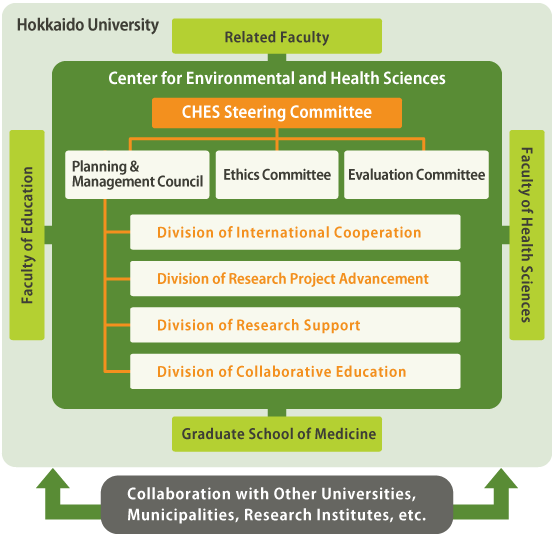Environments and Health
It is important to understand intricate relations between humans, the nature, and social environments, when thinking about issues of environments and health. For example, an understanding of occurrence of pollution-related diseases, destruction of the natural environment, etc., is obtainable by tracing back the histories. Human health is heavily influenced by living conditions (eating habits, dwellings, transport, urban development, etc.), and you may have realized such influence increasing disproportionately. While exercising its influence on human health, people’s life style is in turn strongly influenced by work conditions and other socio-economic factors.
It has been revealed globally that social and environmental factors such as poverty and aging have huge impacts on public health, and countermeasures against them are required. There are also growing issues to be dealt with at global level that cannot be solved by merely a single country, such as global warming, ozone depletion, and unprecedented infectious diseases and chemical contamination.
In short, environments have significant impacts on our health and safety, and they put wide-ranging age groups from infants to the elderly at risk of ill health. Thus, studies from wide angles on how the natural environment and the society sit side by side are increasingly called for.
Mission
Center for Environmental and Health Sciences was established in April 2010 at Hokkaido University as university-wide communal education and research facilities. The center is open to the interested parties across the university and aims to build a solid organizational structure that will be conducive to development of novel research projects, their advancement, and human resource development in the field of “environments and health”. Establishment of the center will see the university’s first-ever cooperation framework in the field of environments and health between Graduate School of Medicine, Graduate School of Health Sciences, Graduate School of Education, etc. We further envision increased joint research with other schools of arts and science, such as agriculture and fisheries sciences that have relevance to food safety, veterinary medicine and dental medicine having, respectively, rich experience in toxicological studies and many overlapping areas in preventive medicine, pharmaceutical science that has many clinical relevance accompanied by the provision of 6-year education programs, engineering which conduct substantial research on human environment in relation to urban planning, water, and waste, information science that has the expertise in statistical analysis, the environment and bioethics, social sciences, etc. This would enable the university to develop a springboard from which various joint research and education in “environments and health” evolve.
The main responsibilities of the center include advancement of research projects. One of the core projects is “Japan Eco&Child Study” (hereinafter referred to as “Eco&Child Study”), which is a national project to be implemented by the Ministry of the Environment from 2011 to 2032. Other ongoing large research projects include (1) “ The Hokkaido Study of Environment and Children’s Health (a prospective cohort study with 20,000 subjects carried out in Hokkaido since 2001, after which the Ministry of the Japan Environment and Children’s study (JECS) was modelled.)”, (2) studies on indoor air quality and health (a nation-wide large-scale epidemiological study on sick house syndrome is conducted), and (3) studies on elderly support network.
Since the setting up of Hokkaido University Initiative on Sustainable Development in 2005, the university has worked for the advancement of research and education and contributed to the international community with their outcomes in five major study fields: (1) global warming, (2) integrated water management, (3) creation of a reduce-reuse-recycle society, (4) food security and forest conservation, and (5) countermeasures against infectious diseases. Establishment of the center adds a new study field (6) “environments and health”, where public health issues in Japan and abroad will be tackled head-on expertly. We envisage that activities at the center be a foundation on which diversified joint research and education are built up and that, in a long term, the center play a leading role in the area of “environments and health” nationally and internationally.
Organization



